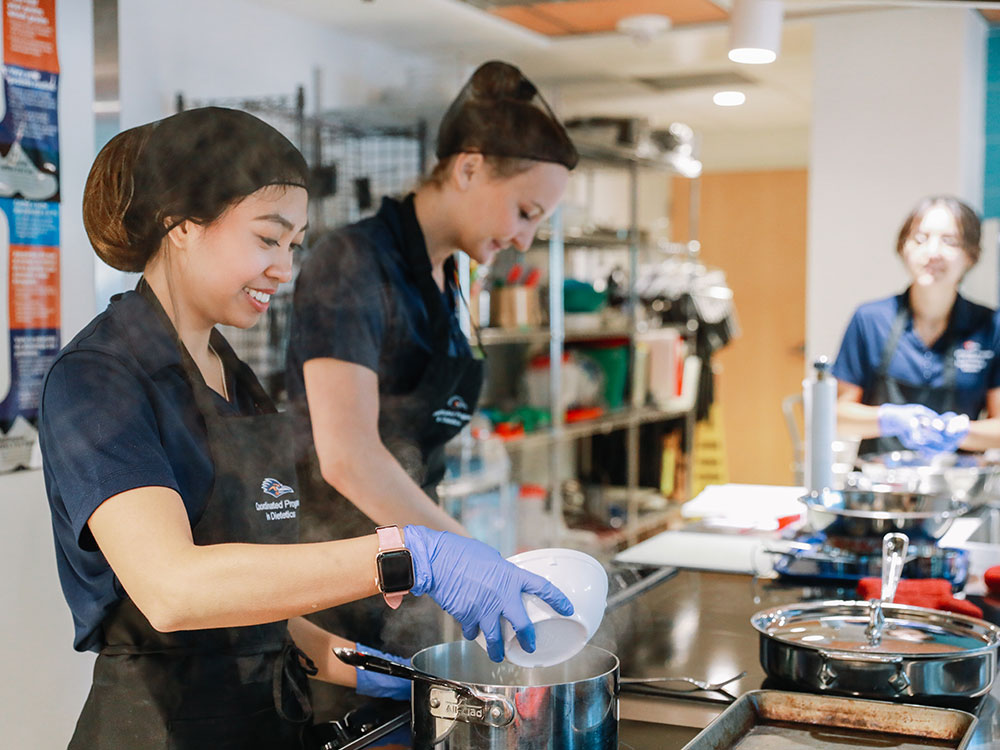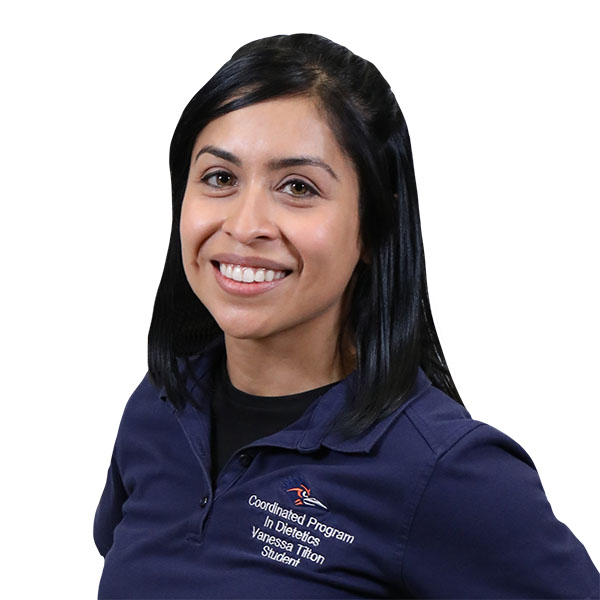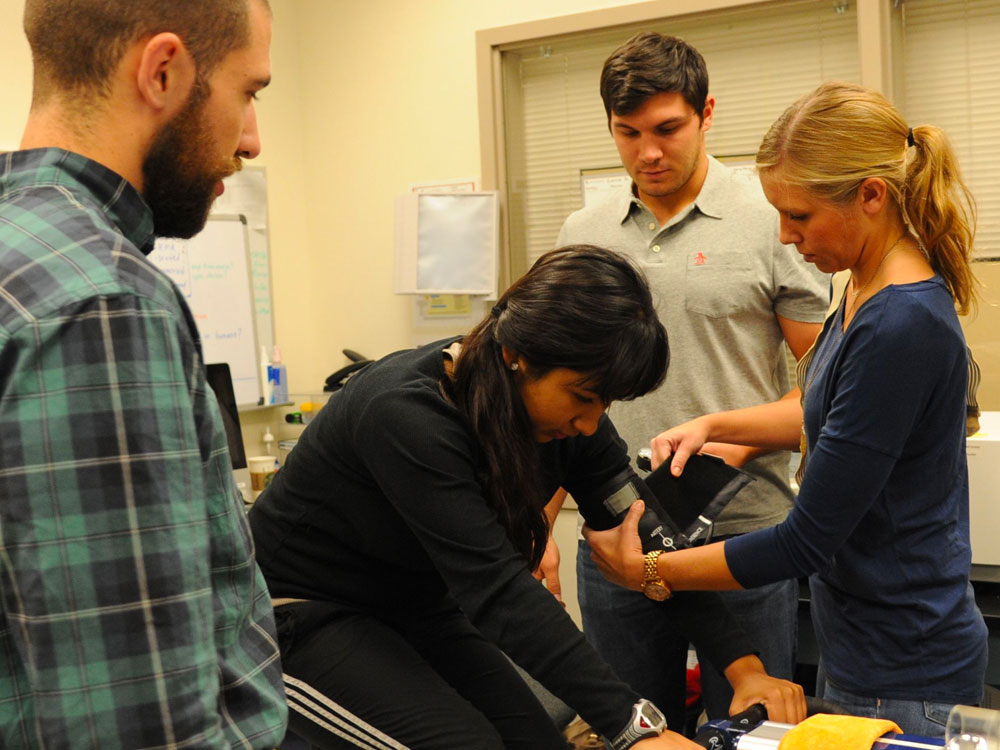90%
Registered Dietitian exam pass rate

UT San Antonio’s Nutrition and Dietetics degree serves as the foundation for the Master of Dietetics Studies (MDS) and is the first step to becoming a registered dietitian. As you work toward earning your BS, you’ll attend classes and acquire off-site practicum hours consisting of community dietetics, clinical dietetics, and food service management. In this unique program, you’ll earn a joint degree in both the BS and MDS, which will certify you to take the national exam to become a registered dietitian.
As a dietitian, you’ll determine the appropriate nutrition interventions for all stages of the life cycle. You’ll find employment in a number of healthcare facilities like hospitals, wellness and fitness centers and food service operations.
Our unique program offers a three-year joint degree (or advanced option), both a Bachelor of Science (BS) in Dietetics and Nutrition and a Master of Dietetic Studies (MDS). The combined degrees offer over 1,000 clock hours of supervised experiences equivalent to an internship. Upon successful completion of the three-year professional program, students will receive a verification statement that certifies their eligibility to take the Commission on Dietetics Registration national examination to become a Registered Dietitian Nutritionist (RDN/RD).

The Coordinated Program in Dietetics is accredited by the Accreditation Council for Education in Nutrition and Dietetics (ACEND) of the Academy of Nutrition and Dietetics. The program is fully accredited through June, 30, 2033.
Learn MoreWhen you apply to UT San Antonio, you select the major you'd like to study. The choice of major will not impact if you get admitted to the University (all students must meet UT San Antonio's general admission requirements); however, some majors will require additional admission requirements to be able to declare the major your freshman year.
Typically by your junior year, students who were admitted into the Nutrition and Dietetics program as a Life and Health Science studies major must meet the following criteria in order to gain admission into the Coordinated Program in Dietetics (CPD). The CPD is a joint program where students will earn both a Bachelor of Science in Nutrition and Dietetics and a Master of Dietetic Studies. Students who successfully complete the joint degree within the program receive a verification statement that certifies their eligibility to take the Commission on Dietetics Registration national examination to become a Registered Dietitian (RD/RDN).
Selection Process: All students apply for UT San Antonio Coordinated Program in Dietetics through Dietetics Inclusive Centralized Application Services (DICAS). The Dietetic Admissions Committee will review completed applications and invite qualified candidates for an interview (until all the spots are filled). For students who live outside Texas and are unable to travel, a video conference interview will be scheduled. Candidate decision letters will be sent according to DICAS deadlines. See the application details link below.
Application Instructions:
Access the application here: https://dicas.cas.myliaison.com/applicant-ux/#/login
Please review the Application details details to understand the DICAS process.
Applications are accepted until the cohort is filled. See the application details for UT San Antonio deadlines.
For more information, please email [email protected].
Pro Tip: Even if you don't think you will qualify for financial aid, you should still submit the FAFSA! Information from the FAFSA could impact certain scholarships that are even merit-based.
Through one general scholarship application, you can automatically be considered for dozens of scholarships at UT San Antonio, including scholarships that are available for this major. In order to access all available scholarship applications on the UT San Antonio Scholarship Hub, you must be an admitted student. If you are a student applying for admission, but have not yet been admitted, you may sign in and complete the Scholarship Hub’s General Application as long as you have authenticated your myUTSA ID and Passphrase. Once you are admitted to UT San Antonio, please sign back in to the Scholarship Hub to see if there are any additional scholarship opportunities available for you to pursue.
UT San Antonio Scholarship Hub Nutrition and Dietetics Scholarship Opportunities
UT San Antonio offers an automatic merit-based scholarship to incoming new freshman and transfer students who display exceptional scholastic achievement in high school by the priority deadline. Non-resident and international students awarded a Distinguished Scholarship for a minimum of $1,000 for the academic year will be granted a waiver for non-resident tuition if scholarship eligibility is maintained. This means out-of-state and international students could pay in-state tuition! For fall admitted freshmen, this scholarship is valued up to $20,000 for up to four years. For fall or spring admitted transfer students, this scholarship is valued up to $6,000 for up to two years. Renewal eligibility must be maintained and funding must be available.
Distinguished ScholarshipsAlthough not a scholarship, UT San Antonio is committed to cover tuition and mandatory fees 100% for eligible students who come from low and middle-income Texas families.
UT San Antonio Bold PromiseDietitians are employed by healthcare facilities such as hospitals, long-term care facilities, and clinics; sports, wellness and fitness centers; food service operations, industry, pharmaceutical and food companies; community programs; government agencies, private practice, and professional health organizations. Their jobs may include offering one-on-one counseling, group education, and assessment of the nutritional needs in an effort to promote health, prevent diseases and treat diseases using medical nutrition therapy. Some dietitians focus on the business aspects of the profession working in food service operations and management at schools, colleges, hospitals, or day-care facilities. Others become entrepreneurs redefining their roles in the media, marketing, consumer affairs, and product development. You will also see nutrition and dietetics professionals teaching in culinary schools, community colleges, universities, and conducting research with food and pharmaceutical companies and other organizations.
UT San Antonio prepares you for future careers that are in demand. See possible careers below. This data is pulled by a third-party tool called Emsi, which pulls data from sources like the U.S. Bureau of Labor Statistics, U.S. Census Bureau, online job postings, other government databases and more to give you regional and national career outlook related to this academic program. On top of the resources your college will provide, the University Career Center offers several resources to help students identify and develop the global skills necessary to successfully pursue and achieve lifelong career goals.
Registered Dietitian exam pass rate
employment rate 12 months after graduation
community partners
If you are a new student applying to college for the first time, follow these steps:
If you are transferring from another institution but have not yet completed a bachelor’s degree, follow these steps:
If you already have a bachelor’s degree and want to pursue a Master of Dietetic Studies (MDS), follow these steps:
If your bachelor’s degree in is another field (not in nutrition or dietetics):
If your bachelor’s degree in is Nutrition, Dietetics or a related field from an ACEND (Accreditation Council for Education in Nutrition and Dietetics) accredited University
Requirements for students to receive the verification statement. The dietetic student will be expected to demonstrate core knowledge and entry-level competency (see definition below) in nutrition and dietetics by successfully fulfilling the course and experiential requirements defined by the Coordinated Program in Dietetics, in accordance to UT San Antonio, CDR and ACEND policies.
Entry-level competence is defined as: a set of specific knowledge, ability, skills, and values; behaviors expected of a practitioner (during the first 3 years of practice); and the minimum level of performance requiring speed and accuracy consistent with providing optima service or care to patients or clients. (Ref. 2022 ACEND CP Standards)
Eligibility for the Registration Examination, the Student Must Have:
When Do Eligible Students Receive the Verification Statement?
Upon successful fulfillment of all program requirements described above, the student will receive a verification statement upon completion of the MDS degree. Students will be recommended to CDR to write the registration examination in dietetics. The verification statement will be presented to the student immediately after graduation. Students may request mailing of the statement if not present at graduation. Copies of verification records will be kept on file in the Dietetics Director’s office indefinitely and will be available to former students upon request.
This handbook is designed to guide enrolled students on issues related to the Coordinated Program in Dietetics (CPD). The information, as well as the policies and procedures are in accordance with those of the University of Texas at San Antonio, the College for Health, Community and Policy and the Accreditation Council for Education in Nutrition and Dietetics (ACEND) Standards.

“CPD (the Coordinated Program in Dietetics) sets you up for success. I love how close I am to the rest of my cohort. I also enjoy the challenges this program brings..."

The College for Health, Community and Policy (HCAP) is a diverse college that provides real world experiences and engages directly in our community. The college contains nine academic disciplines, and these important areas of study directly affect one another. For example, you can’t examine public policy without considering public health, criminology and criminal justice, psychology, nutrition, sociology and more. When you join HCAP, you will choose a degree program that complements your interests, conduct research and study with faculty who are experts in their field and engage with peers that will become lifetime friends.

Research is very important in the field of Health, Community and Policy. As early as your freshman year at UT San Antonio, you will be involved in conducting research studies that will let you act upon your curiosity, learn experientially and make a difference in people’s lives. Some of the areas of research include vaccine access, preventing substance abuse, violence prevention, understanding demographic trends and health impacts, diabetes prevention and improving resources for underserved populations.

Ensuring our HCAP students are ready for the world of work is a top priority. HCAP has a dedicated internship director who coordinates with employers to provide internship opportunities and advice for students. There have been over 140,000 internships hours completed by HCAP students. Courses offer career-engaged learning experiences such as opportunities in undergraduate research, internships and field experiences. The HCAP Student Success Center provides additional outside classroom support in professional development and leadership.

UT San Antonio is all about your success. Our experiential learning initiative takes what you learn in the classroom and helps you apply it to real life. As a student in the College for Health, Community and Policy (HCAP), you will explore, engage and reflect on your experiences to launch your career in a global society. The HCAP Student Success Center is a one-stop resource to help you achieve your academic, personal and professional goals. Receive tutoring, find internships, connect with industry professionals for job opportunities, and enhance your professional development skills through the center’s comprehensive programming.